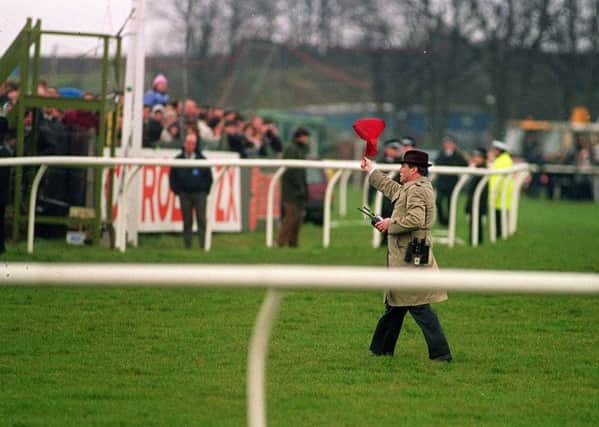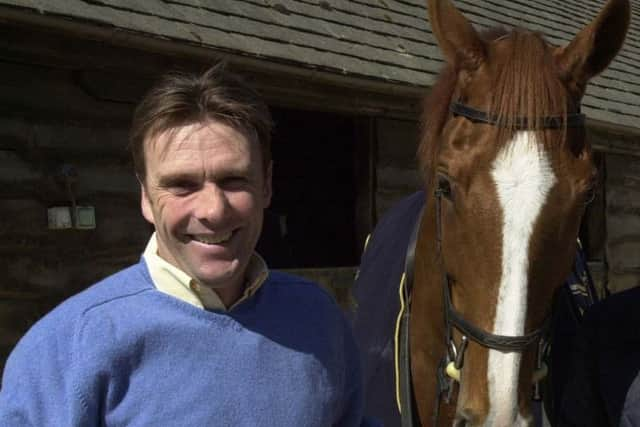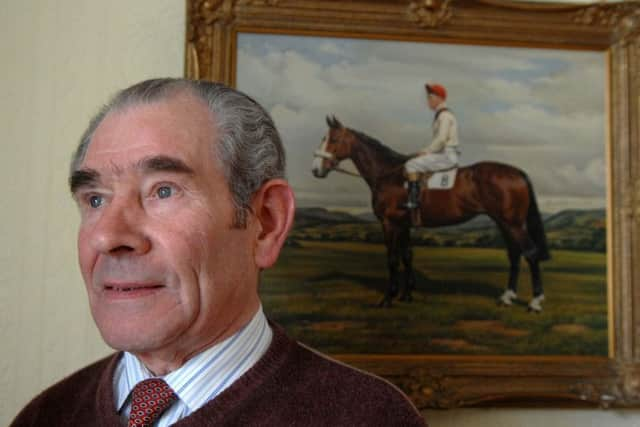Bygones: Void Grand National was a '˜disaster waiting to happen'


The winner of the first televised Grand National, he later became the first victorious rider to start the world’s greatest steeplechase.
Yet, while Scott’s triumph on Merryman II in 1960, and then getting the Aintree runners off to a clean start in 1996 when Rough Quest prevailed, were great highs, his big low came 25 years ago.
Advertisement
Hide AdAdvertisement
Hide AdHe was assistant starter for the most unfortunate ‘first’ in the National’s 156-year history – the void race of 1993.


Described as the “National that surely isn’t” by peerless BBC commentator Sir Peter O’Sullevan as the luckless Esha Ness – ridden by John White and trained by Jenny Pitman – crossed the line, bookmakers had to return an estimated £75m in bets to punters.
O’Sullevan went further in the aftermath. “The greatest disaster in the history of the Grand National,” ventured the ‘Voice of Racing’ who was renowned and respected for his understatement.
He was not alone. Former champion jockey Peter Scudamore, who retired from the saddle weeks later, said riders “were disappointed at what had occurred and had embarrassment for racing in general.”
Advertisement
Hide AdAdvertisement
Hide AdPitman was incandescent. In her autobiography, she recalled how she asked the clerk of the scales in the weighing room: “For Christ’s sake, what the f*** is going on?”


His reply? “We don’t know any more than you, Mrs P. Why don’t you ask the stewards?” She duly did – catching sight on a TV monitor of Esha Ness galloping past the winning post, the first of seven runners to complete the 30-fence course over four-and-a-half gruelling miles.
Then the recriminations began, with most of the ire directed towards race starter Captain Keith Brown and recall man Ken Evans, whose responsibility was to wave a flag in the event of a false start.
Yet, a quarter-of-a-century later, 80-year-old Scott, who still lives near Middleham, still feels that his colleagues were unfairly vilified by racing – and the media – for the farce.
Advertisement
Hide AdAdvertisement
Hide AdAsked whether a rider, or the starter, has the more difficult job on Grand National day, Scott told The Yorkshire Post: “A jockey has one horse to look after. A starter has 40.”


It is perspective that was shaped by his years as a horseman, and association with legendary Middleham trainer Captain Neville Crump, who trusted Scott’s assurances about his fitness after breaking his collarbone in a fall at Doncaster just 12 days before Merryman II’s victory.
“In 1971, I had a horse rear over on me right in the middle of Middleham and I was asleep for 10 days,” he said. “Some of my friends who visited me in hospital didn’t think they would see me awake again. When I came round, the rules had been changed and all riders had to wear skull caps.”
It took Scott, who could hardly talk, a year to recover – he says his life had to “start again” – and he found a role at a riding school particularly unfulfilling when the Jockey Club reconsidered his application to be a starter.
Advertisement
Hide AdAdvertisement
Hide Ad“This was the time of Colonel this and Captain this. They asked ‘When can you come?’ I said ‘I’ll be on the next train’. That’s how it all started on March 1, 1973. I’ve had many firsts – I also started the Princess Royal when she won her first race at Redcar.”


As assistant starter in 1993, Scott was charged with whipping-in the horses as the aforementioned Brown waited – amid high tension – for an orderly line to form before releasing the tape.
All he could see was a “wall of horses” – he was unaware of the commotion further down the track caused by animal rights activists who had invaded the track and whose antics delayed the race for eight minutes.
Yet, when the race did begin, a false start was declared after the tape failed to spring up quickly enough and entangled several riders.
Advertisement
Hide AdAdvertisement
Hide Ad“First of all, Captain Brown had written to the Jockey Club the year before telling them the tape was inadequate and no one took any notice,” disclosed Scott. “It was too slow to release. The track at the start, it’s a hell of a width, and the starter is doing everything possible to tell riders to keep their horses off the tape.”
A disaster waiting to happen, the horses were finally released five minutes later – and a second false start when the tape became entangled around the neck of top jockey Richard Dunwoody.
Yet, while Dunwoody and seven other riders were left stranded at the start, 30 of the 39 runners did set off around the track and did not see the recall flag that the aforementioned Evans – stationed on the long run to the first fence – was supposed to unfurl.
Jockey Peter Niven, now a trainer at Malton, lamented: “I looked for the man with the white flag after we set off the second time but he was ducking under the rails.”
Advertisement
Hide AdAdvertisement
Hide AdScudamore concurred. “The one man I do not blame is the starter, Capt Keith Brown,” he said at the time. “The procedures to start races are perfectly adequate. What is required is a trained man, with decent eyesight, to act as the recall man.”
Pitman held Aintree in contempt. “Before all major meetings, I check all my tack and replace it with new equipment where necessary,” she wrote. “I also insist that my jockeys do the same thing with their saddles, but Aintree continued using a faulty starting system.”
However, Scott believes the riders should have accepted a degree of responsibility after the race was declared ‘void’. He says some ignored warning cones placed in front of The Chair fence at the completion of the first circuit and which were intended to halt proceedings.
“When a starter told you to do something, you did it without a second thought,” he said. “When it’s money, it’s different. When Merryman II won the National, it was £13,000 to the winner. £13,000? You won’t have selling races for that today.
Advertisement
Hide AdAdvertisement
Hide Ad“In those days, if you did manage to have your horse’s nose on the tape, you would be fined. These days, if they don’t get it right first time, you have a standing start. And it works – Mrs Pitman once said her horses wouldn’t start if they were stood still. I said: ‘It’s a good job you don’t train on the Flat’.”
In recent runnings, the Grand National has got off to a relatively smooth start thanks to new protocols – and Gerry Scott will be hoping for the same on Saturday week when he makes his annual pilgrimage down to the start to wish officials ‘good luck’.
For, as he knows, there is the pressure involved with starting every race in an orderly fashion – and then there is the pressure of the biggest, and most famous, race of all.
Scudamore denied big chance to emulate his father
THE decision of Aintree not to re-run the 1993 ‘void’ National denied Peter Scudamore the chance of winning the race.
Advertisement
Hide AdAdvertisement
Hide AdThe eight-time champion jockey retired four days later after riding his 1,168th and final winner.
It meant he could never match the feat of his legendary father Michael, who rode Oxo to victory in 1959.
Yet there was compensation of sorts when One For Arthur prevailed 12 months ago under first-time rider Derek Fox.
The horse – currently sidelined with injury – was trained in Scotland by Scudamore’s partner, Lucinda Russell.
Advertisement
Hide AdAdvertisement
Hide AdThere was a sense, as he soaked up the acclaim of well-wishers, that his family, so synonymous with the sport, were long overdue a second National win.
And, while the Russell stable will not be represented in this year’s renewal, Scudamore’s son Tom – himself a top jockey – is due to partner the David Pipe-trained Vieux Lion Rouge.
Winner of the 2016 Becher Chase over the Grand National course, the horse – ‘Old French Lion’ – has a solid each-way chance if he can show his past form at the end of a disappointing season for the Pipe stable where Scudamore senior enjoyed so much success with the trainer’s redoubtable father, Martin.